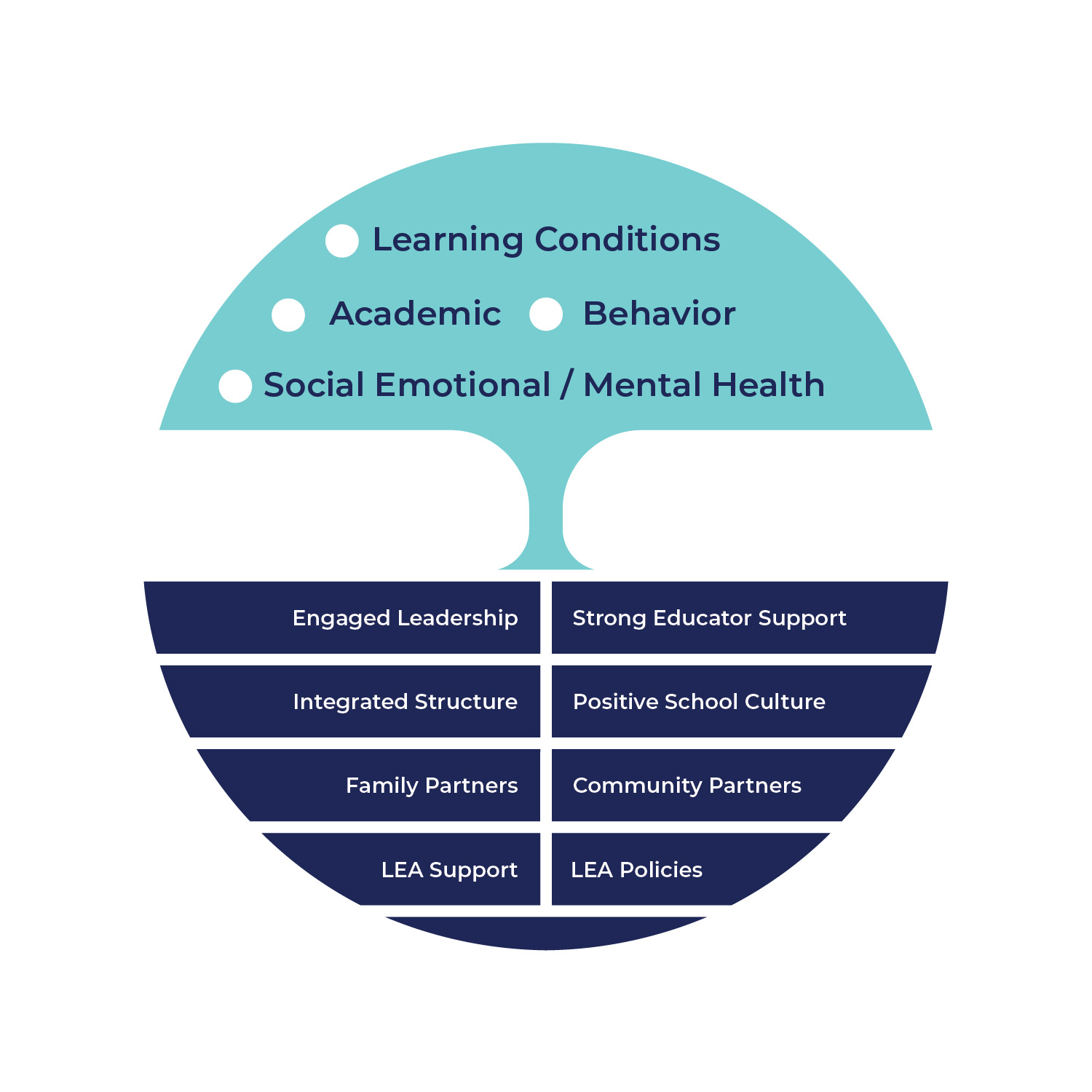Equity-based MTSS Framework
SWIFT’s framework for Equity-based Multi-Tiered System of Support provides a set of practices and processes schools can use to meet the academic, behavioral, social and emotional needs of all students.

Conditions for Teaching and Learning
Educators create impactful Conditions for Teaching and Learning by implementing such practices as collaborative planning, Universal Design for Learning, differentiation, and culturally sustaining practices for all students and across content areas.
Academics
Academic instruction and support are proactively provided for all students at the universal level, with additional and intensified instruction and support as warranted. Academic supports are integrated with Behavior and Social-Emotional instruction within one Multi-Tiered System of Support.
Behavior
Behavior instruction and support are proactively provided for all students at the universal level, with additional and intensified instruction and support as warranted. Behavior supports are integrated with Academic and Social-Emotional instruction within one Multi-Tiered System of Support.
Social-Emotional & Mental Health
Social-Emotional instruction and support are proactively provided for all students at the universal level, with additional and intensified instruction and support as warranted. Schools promote and coordinate proactive school-based mental health services. Social-Emotional supports are integrated with Academic and Behavior instruction within one Multi-Tiered System of Support.
Strong and Engaged Site Leadership
Strong and Engaged Site Leadership is the foundation for implementing, transforming, and sustaining systems throughout a school. The principal and leadership team empower educators and families to contribute to core school decisions to improve teaching and learning.
Strong Educator Support System
A Strong Educator Support System provides the structures that enable educators to constantly improve their practices. Instructional supports may include professional learning, instructional coaching, and supportive, useful evaluation with a focus on building knowledge and skills.
Fully Integrated Structure
A Fully Integrated Structure means full participation in the general education curriculum for all students. All students participate in the general education curriculum instruction and activities of their grade level peers, and schools embrace ways to redefine roles of paraeducators and teaching assistants to support all students.
Strong and Positive School Culture
A Strong and Positive School Culture creates an atmosphere in which everyone feels a sense of belonging in the school. Students have access to extracurricular learning activities with appropriate support, and school personnel share responsibilities to educate all students.
Trusting Family Partnerships
Trusting Family Partnerships contribute to positive student outcomes when caregivers/family members and school staff have respectful, mutually beneficial relationships with shared responsibility for student learning; when family members have options for meaningful involvement in their children’s education and in the life of the school; and the school responds to family interests and involvement in a culturally responsive manner.
Trusting Community Partnerships
Trusting Community Partnerships contribute to positive student outcomes when schools work collaboratively with community members, agencies, organizations, businesses, and industry around common goals. Community representatives directly participate in school leadership, and schools enhance community resources.
Strong LEA/School Relationship
A local educational agency (LEA) partners with the school to promote a shared vision and foster inclusive teaching and learning. Strong LEA/School Relationships use policy to formally organize and integrate initiatives and programs, address and remove barriers to success, and address ways to more effectively use resources.
LEA Policy Framework
The LEA Policy Framework means that the district or local educational agency (LEA) has a formal structure to continually evaluate and rewrite policy in support of quality practices. The LEA uses information from schools to support and ensure staff receive training on relevant research and/or research-based practices.
“We can, whenever we choose, successfully teach all students whose schooling is of interest to us. We already know more than we need to do that. Whether or not we do it must finally depend on how we feel about the fact that we haven’t so far.”
-Ron Edmonds
Edmonds, R. (1979). Effective schools for the urban poor. Educational Leadership, 37(1), 15-24.
Want to learn more about
Equity-based MTSS?

Find resources and tools about Equity-based MTSS.

